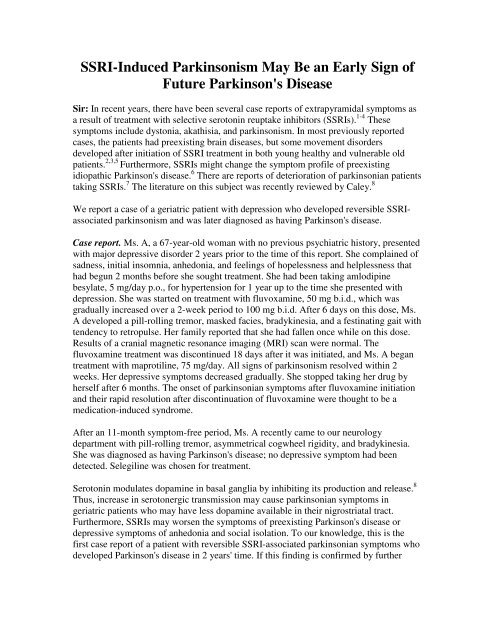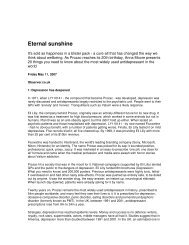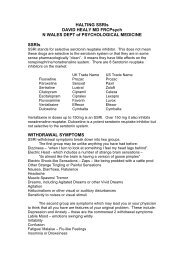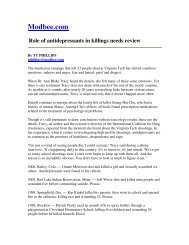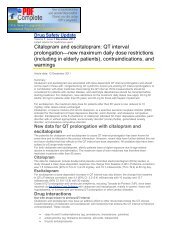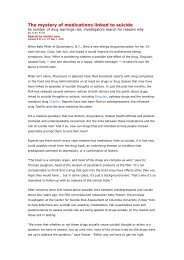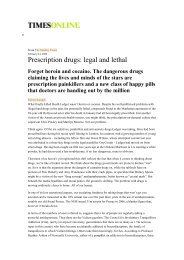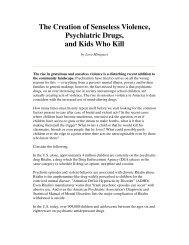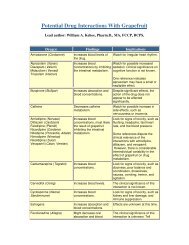SSRI Induced Parkinsonism - Seroxat User Group
SSRI Induced Parkinsonism - Seroxat User Group
SSRI Induced Parkinsonism - Seroxat User Group
You also want an ePaper? Increase the reach of your titles
YUMPU automatically turns print PDFs into web optimized ePapers that Google loves.
<strong>SSRI</strong>-<strong>Induced</strong> <strong>Parkinsonism</strong> May Be an Early Sign of<br />
Future Parkinson's Disease<br />
Sir: In recent years, there have been several case reports of extrapyramidal symptoms as<br />
a result of treatment with selective serotonin reuptake inhibitors (<strong>SSRI</strong>s). 1-4 These<br />
symptoms include dystonia, akathisia, and parkinsonism. In most previously reported<br />
cases, the patients had preexisting brain diseases, but some movement disorders<br />
developed after initiation of <strong>SSRI</strong> treatment in both young healthy and vulnerable old<br />
patients. 2,3,5 Furthermore, <strong>SSRI</strong>s might change the symptom profile of preexisting<br />
idiopathic Parkinson's disease. 6 There are reports of deterioration of parkinsonian patients<br />
taking <strong>SSRI</strong>s. 7 The literature on this subject was recently reviewed by Caley. 8<br />
We report a case of a geriatric patient with depression who developed reversible <strong>SSRI</strong>associated<br />
parkinsonism and was later diagnosed as having Parkinson's disease.<br />
Case report. Ms. A, a 67-year-old woman with no previous psychiatric history, presented<br />
with major depressive disorder 2 years prior to the time of this report. She complained of<br />
sadness, initial insomnia, anhedonia, and feelings of hopelessness and helplessness that<br />
had begun 2 months before she sought treatment. She had been taking amlodipine<br />
besylate, 5 mg/day p.o., for hypertension for 1 year up to the time she presented with<br />
depression. She was started on treatment with fluvoxamine, 50 mg b.i.d., which was<br />
gradually increased over a 2-week period to 100 mg b.i.d. After 6 days on this dose, Ms.<br />
A developed a pill-rolling tremor, masked facies, bradykinesia, and a festinating gait with<br />
tendency to retropulse. Her family reported that she had fallen once while on this dose.<br />
Results of a cranial magnetic resonance imaging (MRI) scan were normal. The<br />
fluvoxamine treatment was discontinued 18 days after it was initiated, and Ms. A began<br />
treatment with maprotiline, 75 mg/day. All signs of parkinsonism resolved within 2<br />
weeks. Her depressive symptoms decreased gradually. She stopped taking her drug by<br />
herself after 6 months. The onset of parkinsonian symptoms after fluvoxamine initiation<br />
and their rapid resolution after discontinuation of fluvoxamine were thought to be a<br />
medication-induced syndrome.<br />
After an 11-month symptom-free period, Ms. A recently came to our neurology<br />
department with pill-rolling tremor, asymmetrical cogwheel rigidity, and bradykinesia.<br />
She was diagnosed as having Parkinson's disease; no depressive symptom had been<br />
detected. Selegiline was chosen for treatment.<br />
Serotonin modulates dopamine in basal ganglia by inhibiting its production and release. 8<br />
Thus, increase in serotonergic transmission may cause parkinsonian symptoms in<br />
geriatric patients who may have less dopamine available in their nigrostriatal tract.<br />
Furthermore, <strong>SSRI</strong>s may worsen the symptoms of preexisting Parkinson's disease or<br />
depressive symptoms of anhedonia and social isolation. To our knowledge, this is the<br />
first case report of a patient with reversible <strong>SSRI</strong>-associated parkinsonian symptoms who<br />
developed Parkinson's disease in 2 years' time. If this finding is confirmed by further
clinical observations, <strong>SSRI</strong>-induced parkinsonism may be an early sign of Parkinson's<br />
disease in vulnerable geriatric patients.<br />
References<br />
1. Klee B, Kronig MH. Case report of probable sertraline-induced akathisia [letter]. Am J<br />
Psychiatry 1993;150:986-987<br />
2. Reccoppa L, Welch WA, Ware MR. Acute dystonia and fluoxetine [letter]. J Clin<br />
Psychiatry 1990;51:487<br />
3. Brod TM. Fluoxetine and extrapyramidal side effects [letter]. Am J Psychiatry<br />
1989;146:1353-1354<br />
4. Wils V. Extrapyramidal symptoms in a patient treated with fluvoxamine [letter]. J<br />
Neurol Neurosurg Psychiatry 1992;55:330-331<br />
5. Schechter DS, Nunes EV. Reversible parkinsonism in a 90-year-old man taking<br />
sertraline [letter]. J Clin Psychiatry 1997;58:275<br />
6. Jimenez-Jimenez FJ, Tejeiro J, Martinez-Junguera G, et al. <strong>Parkinsonism</strong> exacerbated<br />
by paroxetine [letter]. Neurology 1994;44:2406<br />
7. Chouinard G, Sultan S. A case of Parkinson's disease exacerbated by fluoxetine. Hum<br />
Psychopharmacol 1992;7:63-66<br />
8. Caley CF. Extrapyramidal reactions and the selective serotonin-reuptake inhibitors.<br />
Ann Pharmacother 1997;31:1481-1489<br />
Ali Saffet Gonul, M.D.<br />
Murat Aksu, M.D.<br />
Kayseri, Turkey


